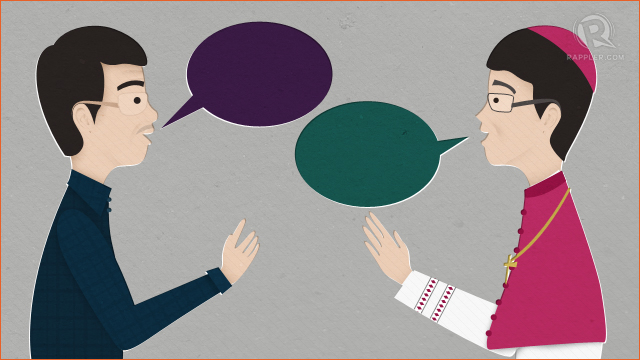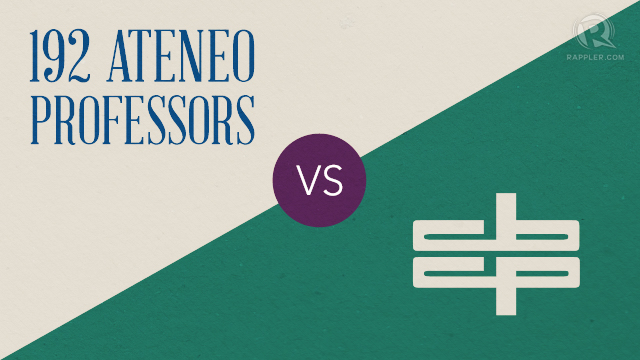SUMMARY
This is AI generated summarization, which may have errors. For context, always refer to the full article.

MANILA, Philippines – How should a Catholic university deal with the Reproductive Health (RH) bill?
The head of the Catholic Bishops’ Conference of the Philippines (CBCP) made himself clear about this last week. “If we are a Catholic school, we should not teach anything contrary to the official teaching of the Church,” CBCP president Cebu Archbishop Jose Palma said.
Professors who teach ideas contrary to Catholic teachings, Palma explained, “are confusing the students.”
Palma said this in reaction to professors from the Jesuit-run Ateneo de Manila University who have publicly expressed support for the RH bill, defying the CBCP’s official stance.
The archbishop’s statement raises questions on the role of Catholic universities in engendering critical thinking, which is expected of universities. It also reflects the Catholic clergy’s attitude toward divergent views, such as when RH bill advocates push for the right of women and poor families to choose their means of family planning.
It is a given: a Catholic school should institutionally adhere to Catholic teachings, as the late Pope John Paul II said in his Apostolic Constitution on Catholic Universities. He said Catholic school teachers should, at least, “respect Catholic doctrine and morals in their research and teaching.”
But John Paul II also said the Church respects academic freedom based on scholarly disciplines – “so long as the rights of the individual and of the community are preserved within the confines of the truth and the common good.”
“Catholic teaching and discipline are to influence all university activities, while the freedom of conscience of each person is to be fully respected,” he explained.
Focus on the poor
When 192 Ateneo professors signed a recent declaration of support for the RH bill, they did so not merely to contradict the CBCP. The professors, including some from the school’s theology department, made their rationale clear.

“It is the poor – and in particular poor women and their children – who stand to benefit the most from the passage of this bill. And should not the poor be the focal concern of any social institution, be it religion, education, or the government?” the faculty members said in a statement first released on August 13 and updated on August 18.
The professors, however, clarified that their stand does not represent that of Ateneo or the Society of Jesus, the religious order that founded the school and is more popularly known as the Jesuits.
They instead invoked “academic freedom and responsibility,” and said they sought to ground their claims on science and empirical evidence. They also considered “the lived experience of the poor and marginalized,” with some of them having lived with the poor in the course of fieldwork.
They also said their position adheres to Catholic social teaching, including principles like the preferential option for the poor and the primacy of conscience.
“We recognize that others who do the same may arrive at a position contrary to ours; however, we view the ability to hold and express divergent opinions on an issue as a sign of a vibrant academic community,” the signatories wrote. (Read their entire position paper below.)
Ateneo president Fr Jose Ramon Villarin, as expected, backed the CBCP in opposing the RH bill. But he qualified the opposition as against the bill “in its present form.”
“Now that the period for amendments is about to begin, I enjoin all in the Ateneo community to continue in-depth study of the present bill, and to support amendments to remove provisions that could be ambiguous or inimical from a legal, moral, or religious perspective,” Villarin said.
He also said “those who are engaged in the Christian formation of our students” should continue to teach the Catholic position on the RH bill.
But Villarin, a physics professor and climate change expert, did not punish the 192 professors who have backed the bill. He recognized them instead as having “grappled with the underlying issues in the context of Catholic social teaching.”
“Though the University must differ from their position for the reasons stated above, I appreciate their social compassion and intellectual efforts, and urge them to continue in their discernment of the common good,” Villarin said.
Online, this series of statements sparked a debate on critical thinking within a Catholic university, in relation to the RH bill. (Read the Storify link below.)
Questioning authority
The clash between the Ateneo professors and the CBCP reflects a wider tension. That’s between the Catholic hierarchy – whose doctrinal authority is practically unquestionable, based on Church teachings – and a well-meaning laity who increasingly want their voices heard.
RH bill advocates claim the proposed law, after all, will not prevent Filipinos from following Church teachings. It will only give them a wider choice.
“Why don’t they listen?” said sociologist Mary Racelis in an earlier interview with Rappler, referring the desire of most Filipinos, based on surveys, for Congress to pass the RH bill.
Racelis was among the 192 Ateneo professors who signed the recent pro-RH bill statement, and also signed a similar statement in 2008. (Watch more in the video below.)
“We’re saying, we’re the laity, we are the Church, why are we not included in some of these discussions? It’s only you who seem to assume that you are the Church,” said Racelis, who addressed the Catholic clergy.
In a statement posted on the CBCP website Wednesday, August 22, Palma said the Church is open to discuss the RH bill with the 192 Ateneo professors. “For me, there’s really a need for a sincere dialogue because the professors, I think, must be motivated by their desire to discover what is good,” Palma said.
In the context of supposedly unquestionable Church teachings, however, such a dialogue is up for a predictable ending. – Rappler.com
Add a comment
How does this make you feel?
There are no comments yet. Add your comment to start the conversation.